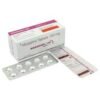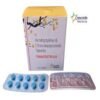What is niacin?
niacin
Get now
Niacin is a water-soluble vitamin that is part of the B-vitamin family. It exists in two primary forms: nicotinic acid and nicotinamide. While it can be obtain through dietary sources—such as meat, fish, eggs, and green leafy vegetables—niacin can also be synthesized in the body from the amino acid tryptophan.
Medical Uses of Niacin
it is primarily known for its ability to manage cholesterol levels. It has been used to:
- Lower LDL Cholesterol: Niacin can help reduce low-density lipoprotein (LDL) cholesterol, often refer to as “bad” cholesterol.
- Raise HDL Cholesterol: It is effective in increasing high-density lipoprotein (HDL) cholesterol, known as “good” cholesterol, which helps protect against heart disease.
- Lower Triglycerides: Niacin has been show to reduce triglyceride levels, contributing to overall cardiovascular health.
Benefits of Niacin
- Cardiovascular Health: Niacin’s ability to improve cholesterol levels can lead to a reduced risk of heart disease, heart attack, and stroke.
- Metabolic Function: It plays a vital role in converting food into energy, supporting metabolic processes.
- Skin Health: Niacin has been use in dermatological treatments for conditions like acne and rosacea due to its anti-inflammatory properties.
- Potential Neuroprotective Effects: Some studies suggest that it may support brain health and protect against neurodegenerative diseases.
Dosage and Administration
it can be prescribe in various forms, including immediate-release, extended-release, and sustain-release formulations. Dosage varies based on individual health needs, with typical starting doses ranging from 500 mg to 2,000 mg per day. It’s essential for patients to follow their healthcare provider’s recommendations.
Side Effects and Considerations
While it is generally safe when take as direct, it can cause side effects, particularly at higher doses. Common side effects include:
- Flushing: Many people experience a flushing sensation, characterized by warmth, redness, and itching of the skin. This is usually temporary but can be uncomfortable.
- Gastrointestinal Issues: Some individuals may experience nausea, vomiting, or diarrhea.
- Liver Toxicity: High doses of niacin can lead to liver damage, so regular monitoring by a healthcare provider is recommend.
- Blood Sugar Changes: Niacin may affect blood sugar levels, which is particularly relevant for individuals with diabetes.
Interactions
Niacin can interact with certain medications, including blood thinners and statins. It’s important for patients to inform their healthcare provider about all medications and supplements they are taking to avoid potential interactions.



